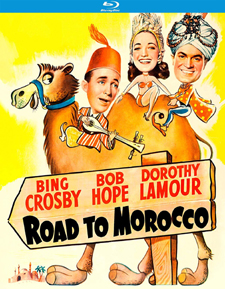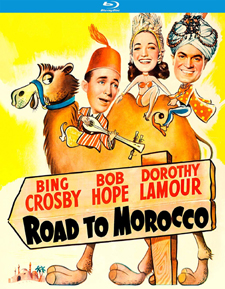Road to Morocco (Blu-ray Review)

Director
David ButlerRelease Date(s)
1942 (March 26, 2019)Studio(s)
Paramount Pictures (Kino Lorber Studio Classics)- Film/Program Grade: B+
- Video Grade: B
- Audio Grade: B
- Extras Grade: B
Review
Road to Morocco (1942), the third of Paramount’s Road movies, once again is set in an exotic locale and features the zany antics of its two stars, Bob Hope and Bing Crosby. After their ship accidentally explodes and sinks, shipwrecked Americans Orville “Turkey” Jackson (Hope) and childhood pal Jeff Peters (Crosby) wash up on the shores of Morocco and ride into town on a camel. Broke and hungry, Jeff hatches a plan to sell Orville to slave traders. When the slavers haul Orville away, Jeff becomes filled with guilt and determines to rescue his pal.
During his search, Jeff comes upon a palace and sees that Orville has been treated well and Princess Shalmar (Dorothy Lamour) wants to marry him. But the princess is engaged to sheik chieftain Mullay Kasim (Anthony Quinn). Orville hooks up with one of the princess’ handmaids (Dona Drake) and the foursome try to escape.
Considered by many as the best of the Road pictures, Road to Morocco still elicits laughs, even though some of the topical references might be lost on contemporary viewers. A few jokes that still work: Turkey says about the desert, “This must be the place where they empty all the old hourglasses.” When Jeff says to Turkey, “We must storm the place,” Turkey responds, ”You storm. I’ll drizzle.” A camel comments, “Sometimes, when I see how silly people behave, I’m glad I’m a camel.” The title song includes the lyric, “We certainly do get around / Like Webster’s Dictionary we’re Morocco-bound.”
Hope and Crosby have excellent chemistry and play off one another beautifully with ad libs, then-contemporary references, and frequent breaking of the fourth wall with asides to the viewer. Analyzed carefully, the plot doesn’t make much sense, but it provides the framework for the jokes and songs.
Many of the gags are outrageous and even surreal. The talking camel, a hamburger joint appearing as a mirage in the middle of the desert, and one sight gag after another keep the pace brisk. The songs by Jimmy Van Heusen and Johnny Burke include Moonlight Becomes You, which would become a Crosby standard, and the clever We’re Off on the Road to Morocco with Hope and Cosby singing atop a camel.
Ms. Lamour, who appeared in all seven Road pictures, gets to wear several eye-catching costumes and serves as both a comic foil as well as a romantic interest. Yvonne De Carlo, who would go on to star as Lily on TV’s The Munsters, can be seen as one of the harem girls.
The Unrated Region A 82-minute Blu-ray release from Kino Lorber Studio Classics features 1080p resolution and an aspect ratio of 1.37:1. The English soundtrack is 2.0 DTS-HD Master Audio and English subtitles are available for the deaf and hard of hearing. Picture quality is sharp throughout, considering the film’s age, with no major flaws, dirt, scratches, or jitter. The special effects are pretty obvious, especially a camel licking the faces of Hope and Crosby. The mirages are simply superimpositions and there is a great deal of process photography to make it seem like action is taking place in the desert. A second unit, with doubles for Hope and Crosby, filmed the desert scenes in Yuma, Arizona.
It’s a shame the film is in black-and-white, because a great deal of attention was devoted to making the Paramount sound stages and back lot look like Morocco. Ms. Lamour’s costumes are very pretty and would have been shown to advantage in Technicolor.
Sound is well-balanced throughout, with the dialogue dominating. The jokes are spaced in anticipation of a theater audience’s reaction as the director didn’t want prolonged laughter from a preceding joke to obscure the next one. Victor Young’s score is mostly upbeat to match the comic action, but is tender during the romantic scenes between Crosby and Lamour.
Bonus materials include an audio commentary, a career overview of Bob Hope, a 1945 Armed Forces Radio Service short, a Trailers From Hell trailer with John Landis, and four additional trailers.
Audio Commentary – Film historian Jack Theakston provides a fact-filled discussion of the film, noting that it was originally titled Follow the Sun and planned for George Burns and Gracie Allen to star with Crosby. The title was changed to Road to Mandalay and finally to Road to Morocco. Hope and Crosby had worked together before the first Road picture (Road to Singapore). Victor Schertzinger directed the first two Road pictures and was scheduled to direct Road to Morocco, but he died and David Butler, a veteran of many movie musicals, replaced him. Butler had directed Hope and Lamour in Caught in the Draft in 1941. The title song was shot live without a playback, which was unusual at the time, probably to accommodate Hope and Crosby’s many ad-libs. The zoom lens was used in the cinematography, also unusual for a 1940s movie.
Bob Hope and the Road to Success – The Road pictures offered escapism with their exotic locations and freewheeling comedy, taking audiences away from concerns about World War II. Phyllis Diller comments on Hope’s versatility – he was a comedian who could sing and dance. He started in vaudeville, jumped to Broadway, then radio, the movies, and finally television. He was never afraid to embrace another medium. Hope and Crosby had engaged, on their radio shows, in friendly insults and banter. Writers, who were on the set for on-the-spot rewrites, attempted to capture this style with one gag after another. The formula in the Road pictures was that Crosby always got the girl. Road to Morocco is considered the best in the Road series. These pictures established Hope as a movie star.
Command Performance (1945) – Produced for the Screen Magazine by Armed Forces Radio Service, this short stars Bob Hope performing on radio with fellow comedian Jerry Colonna.
Trailers From Hell – Director John Landis comments, over the theatrical trailer, that Road to Morocco was timely in 1942 because the Allies had just landed in North Africa. He refers to the film as “cheerfully misogynist and racist.”
Road to Morocco Sing-Along – The title song sequence is shown with lyrics at the bottom of the screen, karaoke style.
Trailers – Theatrical trailers for Road to Singapore, Road to Zanzibar, Road to Morocco, and Road to Utopia are included.
– Dennis Seuling

